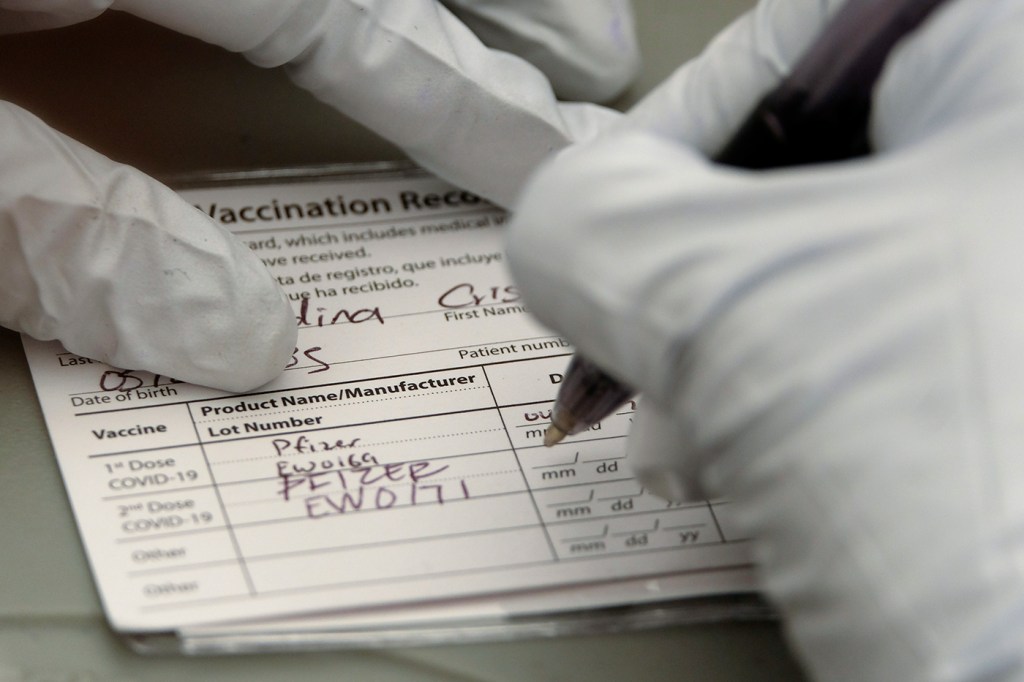What do vaccine passports mean to you?

With more than 120 million U.S. residents fully vaccinated and eager to visit book stores and restaurants again, some businesses may require people to show vaccine credentials to prove that they have received their shots. The issue has ignited a political controversy, leading researchers to wonder: Has the phrase “vaccine passports” become politicized?
The answer, according to a survey by researchers from Northeastern, Harvard, Northwestern, and Rutgers, is no.
A passport is documentation that proves a person has been fully immunized against SARS-CoV-2, the coronavirus that causes COVID-19. Some of the credentials come in the form of a wallet-size card handed out by the Centers for Disease Control and Prevention, others can be pulled up on a phone as an app.

David Lazer, university distinguished professor, holds joint appointments in the College of Social Sciences and Humanities and the Khoury College of Computer Sciences. Photo by Adam Glanzman/Northeastern University
Whether to adopt vaccine passports is not widely agreed upon by business owners, politicians, or the public. Researchers sought to find just how large the divide was over the issue. They were surprised to learn that the public was not as split over the term “vaccine passports” as they had expected.
“We thought that there might be a very sizable difference in attitudes among respondents, but in reality we did not find a very substantial difference,” says David Lazer, university distinguished professor of political science and computer sciences at Northeastern and one of the researchers who conducted the study.
Nearly 13,000 U.S. residents were asked in an online survey whether or not they supported businesses requiring proof of vaccination. Specifically, should businesses be required or allowed to require that customers show proof that they have been immunized against the coronavirus.
The goal of the questioning was twofold: to find out how much of a difference it made for respondents when the government requires the implementation of vaccine passports, and whether the term “vaccine passport” itself made a difference in how a person views the documents.
Whether or not “vaccine passport” was included in the question, respondents were equally unenthusiastic about the idea that customers be required to provide proof of vaccination before entering a business, regardless of whether businesses are forced to require the documents, or allowed to choose whether to do so.
The study found that fewer than 30 percent of respondents supported businesses requiring customers to show a vaccine passport, regardless of whether establishments are forced to do so.
The highest support (29 percent) came from respondents who believe that businesses should be allowed to require vaccines, whether or not the term “vaccine passports” is explicitly mentioned. The lowest support (25 percent) was for requiring that businesses mandate vaccines, but without explicitly mentioning passports.
The four-point percentage difference was small, but meaningful, Lazer says.
“There’s a bit higher support for allowing rather than forcing businesses.”
The findings could explain why the governors of some states with a larger number of residents who oppose getting vaccinated have taken recent action to ban establishments from turning away customers who can’t or won’t provide proof that they have had their shots, Lazer says. “It’s a way they can appease their base by saying, ‘we don’t want vaccine passports,’” he says.
“In Florida, your personal choice regarding vaccinations will be protected and no business or government entity will be able to deny you services based on your decision,” Republican Gov. Ron DeSantis said earlier this month, when he signed a bill banning vaccine passports, a catch-all phrase for immunization credentials.
Similar steps have been taken by the governors of Texas and Utah.
But some businesses, including airlines, are requiring customers to show documentation that they have been inoculated. They’re just not using the phrase “vaccine passports.”
Delta Air Lines CEO Ed Bastian said in an April interview with Yahoo! Finance “We don’t call it a vaccine passport. It carries too many connotations.”
Bastian said Delta is “more focused on a credential, travel credential, if you will, to indicate that you’ve been vaccinated and or tested based on the regulatory requirements.” United Airlines, another major U.S. carrier, has a similar approach.
Cruise ship companies such as Royal Caribbean require proof of COVID-19 immunization for customers 18 years of age and older, either in the form of a CDC card or documentation from a doctor who administered the doses.
Without a uniform vaccination standard, it will be difficult for companies to turn people away now that the CDC has relaxed mask requirements for vaccinated individuals, Northeastern’s Lazer predicts.
“If we don’t have a system of proving that you’re vaccinated, then something like policies where you want people to wear masks become very difficult to enforce,” he says.
The federal government will not mandate passports for businesses or events, Anthony Fauci, chief medical adviser for President Biden, said in an April interview. “I doubt that the federal government will be the main mover of a vaccine passport concept,” he said.
Instead, the White House has said that it would defer to private companies if they wanted to implement some type of vaccine passport system to require individuals to provide proof that they are inoculated.
Northeastern’s Lazer says the survey shows no consistent pattern across demographic groups with respect to the term “vaccine passport” itself. Some groups are more supportive when the term is explicitly mentioned, while others are more supportive when it is not.
“This suggests that the name is not an important limitation on public support for mandatory proof of vaccination,” researchers wrote.
Men were more supportive than women, especially when characterized as optional and explicitly labeled as vaccine passports. Democrats were far more in favor than Republicans or independents, especially when the question indicates that businesses would be allowed to require passports rather than mandated to require them.
Republicans and independents were least supportive when policies were characterized as a requirement for businesses.
Now that most of the U.S. population that wanted their doses have received them, Lazer foresees nationwide vaccination efforts shifting to people who are either having difficulty getting their shots or are reluctant but not outright opposed.
“That’s going to be a slog,” he says.
There will also likely be policy discussions among school districts about whether to require vaccinations before children return to school in the fall. That may set up a battle with mothers, who, prior research has shown, remain largely opposed to inoculating their children.
For media inquiries, please contact media@northeastern.edu.




